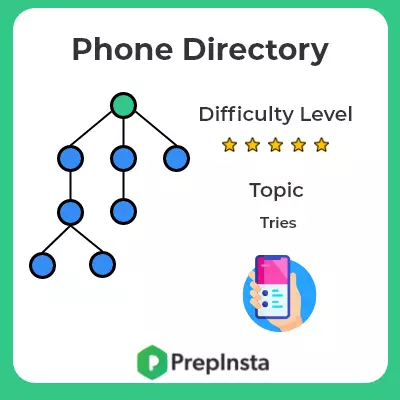Phone Directory Implementation
Phone Directory Implementation in C++
This problem is basically about implementing the search feature that is found in our mobile phones contacts app. Whenever we enter a partial name or a string in the search bar, it lists out all the possible contacts which have same prefix. Here is explanation of Phone Directory Implementation in C++.

Problem Description
We are given a array of n strings. We are also given another string. We have to print all strings from the array who have some prefix exactly matching with the given string.
Example :
Suppose the given array is :
string arr[5] = {“Abcd”, “Abcdef”, “Xyz”, “Abcdefgh”, “Xyz abc”}
Query string is :
string query = “Abcd”
The output should be :
The matching Records are for Abcd are
Abcd
Abcdef
Abcdefgh
Abcd
Abcdef
Abcdefgh
Phone Directory in C++ Algorithm:
We can solve the problem using tries. You can learn about Trie Data Structure from here.
Step 1 Insertion of Strings in the Trie
- Create a class consisting of a map that points to child nodes and a boolean variable isFinal. The boolean variable is used to mark the end of a string since we can have strings with common prefixes in the given array ( eg aaa, aaaa) . It is set to false by default.
- Iterate over the string array and add strings to the trie.
- After adding the last character mark the isFinal boolean as true.
Step 2 Printing the matching Strings
The print function is basically a extension of the search functionality that we have implemented in basic trie.
- Iterate over the trie and keep moving till there are matching nodes for the characters of the query string.
- If we encounter a character such that there is no child node present , this means we have no matching string and we can return from here.
- After matching all the characters we basically have to generate all possible strings using recursion. The isFinal variable will come handy when we want to print the string.
C++ Code:
#include <bits/stdc++.h>
using namespace std;
class TrieNode
{
public:
// If we want the output in sorted manner we use map
// Otherwise we can use unordered_map also
map<char, TrieNode *> M;
bool isFinal; // This boolean marks the end of a string
TrieNode()
{
isFinal = false;
}
};
void insert(TrieNode *&head, string s)
{
TrieNode *temp = head;
for (int i = 0; i < s.length(); i++)
{
char c = s[i];
if (temp->M.find(c) == temp->M.end())
temp->M[c] = new TrieNode();
temp = temp->M[c];
}
temp->isFinal = true;
}
// Recusive check all nodes (DFS)
void print(TrieNode *head, string s)
{
if (head->isFinal)
cout << s << endl;
map<char, TrieNode *>::iterator it;
for (it = head->M.begin(); it != head->M.end(); it++)
{
print(it->second, s + it->first);
}
}
void printAll(TrieNode *head, string query)
{
TrieNode *temp = head;
for (int i = 0; i < query.length(); i++)
{
char c = query[i];
if (temp->M.find(c) == temp->M.end())
{
cout << “No records found “
<< ” for “ << query << endl;
return;
}
temp = temp->M[c];
}
cout << “The matching Records are for “ << query << ” are” << endl;
print(temp, query);
}
int main()
{
int n = 5;
string arr[5] = {“Mr Abc”, “Xyz”, “Xyz abc”, “abcd “, “Xyz abcde”};
TrieNode *head = new TrieNode();
for (int i = 0; i < n; i++)
{
insert(head, arr[i]);
}
string query = “Xyz”;
printAll(head, query);
cout << “********************************” << endl
<< endl;
query = “Mr Xyz Abc”;
printAll(head, query);
return 0;
}
Output:
The matching Records are for Xyz are
Xyz
Xyz abc
Xyz abcde
********************************
No records found for Mr Xyz Abc



Login/Signup to comment